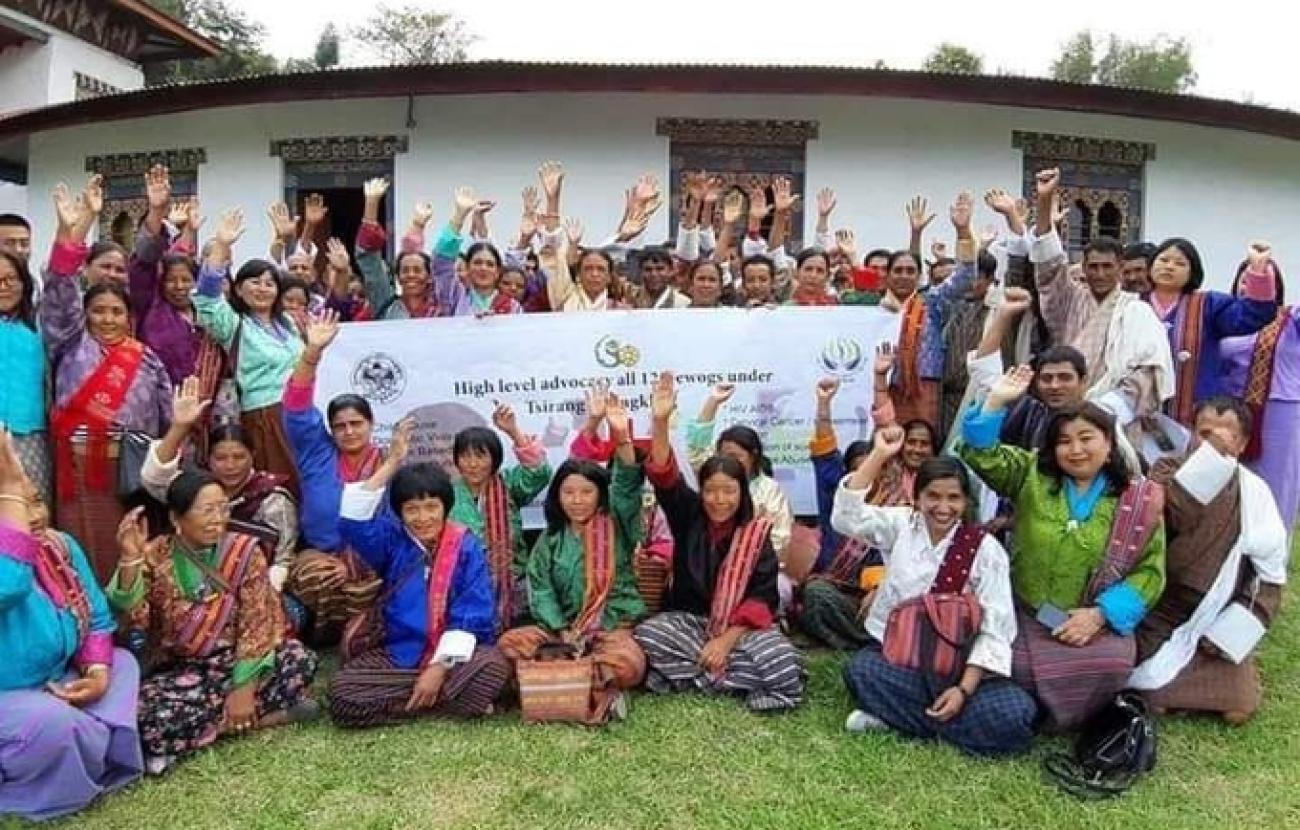Taking Shelter: Communities tackle gender-based violence amid COVID-19 in Bhutan

The past year has seen an increase in GBV in the Himalayan kingdom by almost 37% with 777 cases - and UNFPA and partners are taking action to help.
Thimphu, Bhutan - At the very outset of the COVID-19 pandemic in early 2020, UNFPA warned that lockdowns and other movement restrictions meant to contain the outbreak could have unintended consequences, including an escalation in gender-based violence (GBV), particularly domestic abuse – with women confined in the same space as their abusers, usually within the family.
Unfortunately, that prediction has come true globally, including in Bhutan.
The past year has seen an increase in GBV in the Himalayan kingdom by almost 37% with 777 cases - as recorded by RENEW (Respect, Educate, Nurture and Empower Women), a non-profit organization.
Inspired by a call from Bhutan’s Queen, Her Majesty The Gyaltsuen Jetsun Pema Wangchuck to provide shelter services for those in need during the second nationwide lockdown in December 2020, members of the Multi Sectoral Task Force – Community Based Support System (MSTF-CBSS) across 20 Dzongkhags (districts) mobilized efforts to protect those in need with support from dzongkhag administrations.
Tshering Lham, a member with CBSS since 2010, was one such volunteer who worked with determination towards making this happen. Efforts by her and CBSS co-members have led to the municipal office in the district of Tsirang now serving as a temporary relief shelter to accommodate survivors of domestic violence, homeless individuals and those stranded by the latest nationwide lockdown which came into effect on December 22, 2020.
“We are prepared and stocked with adequate food supplies and other essential items to assist those coming to the shelter,” says Lham.
MSTF and CBSS were formed under the leadership and close guidance of UNFPA Goodwill Ambassador and Patron of RENEW, Bhutan’s Queen Mother, Her Majesty Gyalyum Sangay Choden Wangchuck in 2001 and 2004 respectively.
MSTF is a formal network for health priority dissemination under the Ministry of Health while CBSS is a project aimed at a long-term approach towards sustainability and community ownership of RENEW’s services which include providing safety and relief services to survivors of interpersonal violence and reducing vulnerabilities of disadvantaged population groups.
“GBV is a public health concern with manifold consequences. Right from the first lockdown, the need for such service centers was evident. We must establish emergency shelters in every dzongkhag in order to prevent GBV and help survivors,” says Tshering Dolkar, Executive Director, RENEW.
The work of RENEW stretches beyond preventing and responding to gender-based violence, with a life-cycle focus on the health, well-being and rights of women and girls as envisioned under the mandate of UNFPA, the United Nations Population Fund, which works with governments and civil society partners like RENEW globally.
“RENEW’s commitment and work is steadfastly contributing to the Royal Government of Bhutan’s commitment under its 12th five-year national development plan, the sustainable development goals, and towards UNFPA’s Three Zeros – Zero GBV and harmful practices against women and girls, zero unmet need for contraception and Zero preventable maternal deaths by 2030,” notes Dolkar.
Today, through extensive efforts by UNFPA Bhutan and RENEW, CBSS is functional in all 20 dzongkhags with 100 committed coordinators, five in each district, working closely with service providers. CBSS members have set up community action groups focused on the elimination of interpersonal violence, ensuring accessibility of services and helplines for survivors and documentation of reported cases.
UNFPA Bhutan in collaboration with RENEW conducts regular capacity building interventions on sexual and reproductive health and prevention of gender-based violence, and has trained more than 600 volunteers.
“The training programmes by UNFPA proved timely to prepare us on how best to support the community during emergencies such as the nationwide lockdown due to COVID-19” says Tshering Lham, trained on the prevention of GBV and inter-personal violence (IPV) in November 2020.
“Understanding GBV and measures on its prevention through the rigorous training has given us the confidence to work towards GBV prevention in our own small way,” adds Lham.
Like Tshering Lham, there are many enthusiastic volunteers across Bhutan who are working diligently towards creating a safe, secure and equal society, free from all forms of violence against women and girls.
The experience from the first lockdown highlighted the need to have more facilities to support GBV survivors and, at the request of Bhutan’s Queen, Her Majesty The Gyaltsuen Jetsun Pema Wangchuck, additional shelter services have been established.
UNFPA Bhutan remains resolute in suporting the Royal Government of Bhutan in its commitment to ‘Leaving No One Behind’ – the vision of the Sustainable Development Goals - and has supported the establishment of six shelter homes in 2020 to address the issue of gender-based violence. Five of these have been funded through the Australian Department of Foreign Affairs and Trade (DFAT), a key UNFPA development and humanitarian response partner in Asia-Pacific and globally.
-----
UNFPA, the UN’s sexual and reproductive health agency, works in over 150 countries, including Bhutan.
UNFPA seeks to achieve zero maternal deaths, zero unmet need for family planning and zero gender-based violence and harmful practices against women and girls.
For more on our response to the COVID-19 pandemic, visit https://www.unfpa.org/COVID19
To support our lifesaving work amid the pandemic, visit https://donate.unfpa.org/th-en/covid-19



